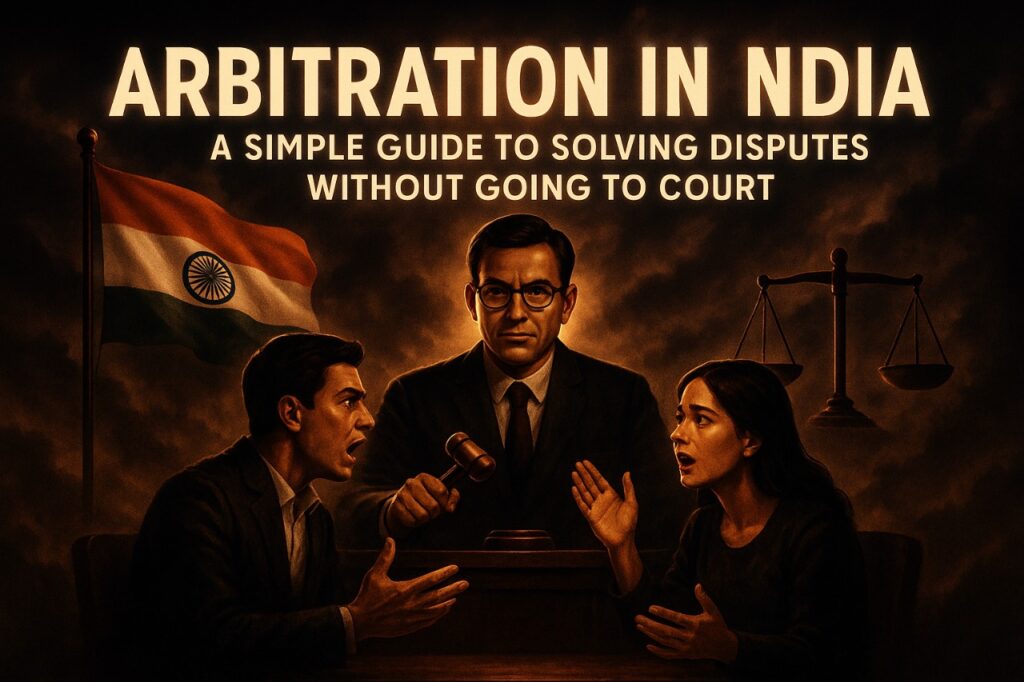
Legal disputes can be draining both emotionally, financially, and time-wise. That’s where Arbitration steps in. Whether you’re running a startup, handling commercial contracts, or facing a partnership conflict, Arbitration offers a faster and more private way to resolve things without going through the traditional court process.
But how does it work in India? Is it really binding? And what about the costs?
Let’s walk you through the basics so you can decide if Arbitration is the right move for your situation.
What is Arbitration, Really?
Think of Arbitration as a private courtroom. Instead of a judge, you have an arbitrator – a neutral person (or panel) who listens to both sides and makes a decision. This decision is called an “award,” and it’s legally binding, just like a court verdict.
Arbitration is governed by the Arbitration and Conciliation Act, 1996, which has evolved over the years to match global standards.
Why More People Are Choosing Arbitration
- Quicker resolutions: You don’t have to wait years like in regular courts.
- Private and confidential: Sensitive information stays out of the public eye.
- You choose your arbitrator: Get someone who understands your industry or dispute.
- Flexible process: Less rigid than courts. The parties can agree on procedures.
- Enforceable awards: The decision has legal weight and can be enforced like a court order.
How the Arbitration Process Works in India?
Here’s a simplified breakdown:
- Agreement Comes First
Usually, there’s a clause in the contract that says disputes will be handled through Arbitration. - Starting the Process
When a dispute arises, one party sends a formal notice to the other side to begin Arbitration. - Choosing the Arbitrator(s)
Either a sole arbitrator is picked, or each party selects one, and those two appoint a third (in case of a panel). - Getting Ready for Hearings
A preliminary meeting is held to fix timelines and decide how things will proceed. - Sharing Evidence
Both sides submit their versions of events, along with documents and other evidence. - Hearings (if needed)
Some Arbitrations happen on paper. Others may involve physical or virtual hearings. - Award is Given
The arbitrator gives a final decision. This is called the arbitral award. - Enforcement
The award is treated like a court decree and can be enforced if the other side doesn’t comply.
Can Arbitration Awards Be Challenged?
Yes, but only on limited grounds like fraud, bias, or a serious procedural lapse. Courts generally respect Arbitration decisions and rarely interfere unless there’s a strong reason.
How Much Does Arbitration Cost?
The costs vary depending on the complexity of the matter and how the process is handled:
- Arbitrator’s fees: Fixed as per the law (or as agreed between parties).
- Lawyer fees: Depends on the nature of the dispute and the experience of the legal team.
- Venue and logistics: Physical hearings can cost more.
- Administrative fees: Applicable in institutional Arbitration (like with ICA, SIAC, etc.).
When Should You Consider Arbitration?
Here are some common scenarios where Arbitration makes perfect sense:
- Business or partnership disputes
- Construction and infrastructure contracts
- Cross-border or tech agreements
- Intellectual property and licensing issues
- Real estate and joint venture conflicts
Mistakes to Avoid in Arbitration
- Vague or missing Arbitration clauses in your contracts
- Choosing arbitrators without relevant experience
- Not participating seriously in the proceedings
- Assuming court rules will apply as the Arbitration has its own way of doing things.
Author Name
By Ananthakesavan V
